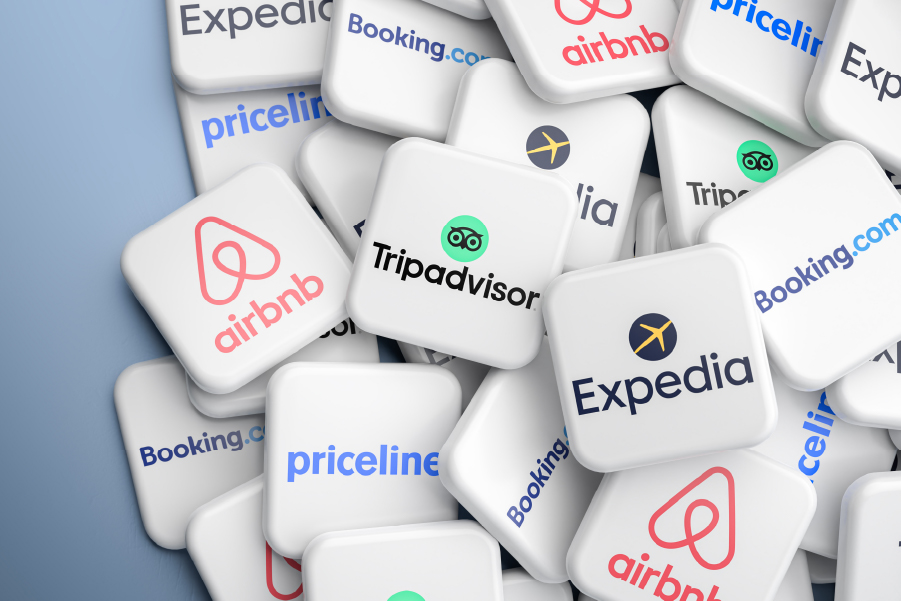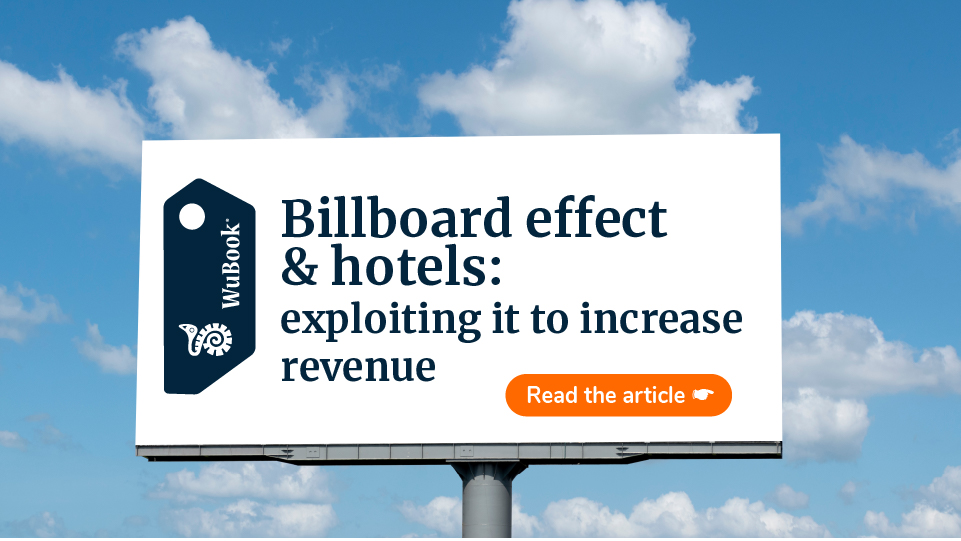Dear WuBookers, if you run a hotel or lodging establishment, you have certainly heard on several occasions about the so-called “billboard effect”: which emerged in the early 2000s, then was declared defunct, then resurfaced bright and shiny in the industry news.
Today we want to try to shed some light on this very phenomenon and understand how it can be exploited by hoteliers and property managers also with the help of WuBook.
What’s the Billboard Effect?
The definition comes from a 2009 study conducted by Chris Anderson for Cornell University in New York. The situation described by Anderson, in fact, was similar to that of someone who – after seeing a billboard – looks for the product, moved by curiosity.
But how does this apply to hospitality? Let’s look at an example.
A person is looking for accommodations for his upcoming trip and, as a first step, he goes to an OTA portal and starts evaluating different options.
They spot one or more, but do not proceed with the reservation, because they leave and go to Google (or any other search engine). There, they search for the name of the accommodation they are interested in and finalize the reservation directly on the accommodation’s website.
In summary, then, the billboard effect is the process by which distribution channels produce an increase in direct sales. The first survey reported a range of 9% to 26% more bookings, while the next (2011) survey revealed that about 75% of customers who had reserved a room from the hotel site had first visited an OTA channel.
And today?

The billboard effect today
Changes in the markets, the ubiquitous presence of OTAs, and the emergence of major new players such as Google among metasearch (partly mitigated by the recent European Digital Markets Act) have led to the talk of the death of the billboard effect.
In the update of 2017 Anderson claims that this is a phenomenon that has all but disappeared, though certainly complicated by an increasingly convoluted and, therefore, less linear funnel (i.e., booking path).
“The ability of a second-party channel to influence a finalized reservation,” the report says, “may be lower, but the billboard effect still occurs, as many consumers visit an OTA before booking.”
Ergo, it is important to figure out how to take the most advantage of it, including using the technological tools available.
Investing in OTAs that matter
The first point is really about OTAs. It is important that these are chosen carefully to avoid wasting budget on platforms that are poorly aligned with one’s target audience or ineffective.
Going beyond 5 or 6 platforms can also cause a scattering of data and an increased burden of ads and offering maintenance activities.
Speaking of advertisements, once we have defined the right OTAs for us, it is good to take care of communication in every detail, without neglecting descriptions, photos or other useful information in order to be found even outside the agency portal.

Activate a direct reservation system
The potential customer has seen your facility on the OTA and arrived on the site, so how do they book? It seems obvious, but without an integrated booking system, the user will just have to leave again – probably dissatisfied – and do it all over again. Not a great prospect.
Zak’s Booking Engine (WuBook’s PMS for hotels), allows hoteliers and managers to leverage their site for direct sales of accommodations, safely and without brokerage costs. Not only that, it is designed to facilitate the process for the user, preventing them from getting impatient and abandoning the whole thing. For example, with Zak’s Booking Engine, it is not necessary to register with the site to proceed and it is possible to finalize the payment partially or in full, depending on the settings given by the hotelier for their own and the end customer’s protection.
In addition, the system provides alternative dates and solutions: perfect for those seeking flexibility and maximum customization.
Define and manage (well) rates
The rate plan is the other big element to consider when designing your sales strategy. Proposing an exclusive treatment for those who book on the hotel site is one of the most common ways to ensure that the billboard effect has the desired outcome. This can translate into lower prices, but also into advantageous cancellation policies or free extra services, absent in other channels. Or again, according to the principle seen just above, in limiting the availability of OTAs relative to the official site, so as to sell more and maximize disintermediated earnings.
Therefore, on the one hand it is essential to manage one’s online inventory well in practical terms: Zak’s Channel Manager ensures this by guaranteeing that one’s offer is connected and updated instantly on all major OTAs.
On the other hand, it is equally crucial to have a general overview of your sales conditions on the various channels, to avoid making mistakes at the expense of direct performance. That is why, within Zak, there are two tools, Tabla and Sytar, which allow you to view and modify prices, availability and restrictions by taking action on a day-to-day or mass basis, respectively.
The hotelier can then keep an eye on price, availability and sales restrictions at all times, distinguishing each rate between brokerage portals and the proprietary channel.

SEO and user experience improvement
For the property’s site to be easy to find, it must meet a number of requirements of Google and other search engines, which make it visible to users when they perform a relevant search (e.g., the name of the hotel). This is what SEO optimization is for, an aspect that is often overlooked but essential for getting results from organic traffic. Zak’s Site Creation Module allows you to build the facility’s site already integrated with the Booking Engine and with all the useful sections to improve the online ranking of the various pages.
At the same time, it is important to encourage user navigation within the site by designing clear paths and encouraging booking through persuasive texts, curated images and unambiguous call-to-actions.
The benefits of the billboard effect
The benefits of the billboard effect for hotels, B&Bs and vacation homes, are quite obvious but we can summarize them in 3 main points:
- Reduces brokerage costs because it generates reservations on the facility’s site;
- increases the potential of investing on OTAs, which not only produces indirect sales but also encourages direct ones;
- facilitates the fidelity of customers who, by coming into contact with the facility, can create an immediate and unfiltered relationship by also participating in reward programs not available elsewhere.
All this can be achieved with a careful and somewhat dynamic strategic approach. Indeed, it is not necessarily so easy to determine where direct bookings are coming from (in terms of acquisition channels) and to understand the value of each individual channel in overall revenue. An issue that Anderson calls “the attribution conundrum” and which can be solved through a series of experiments in which hotels stop some of their promotional activities for short periods of time (e.g., preferential placement in OTAs, sponsored search on Google, and so on) and compare the volume of transactions received with or without those activities.
Whatever the outcome, knowing the existence of the billboard effect and being able to exploit it effectively helps to consider OTAs and their contribution to business in the right light.
